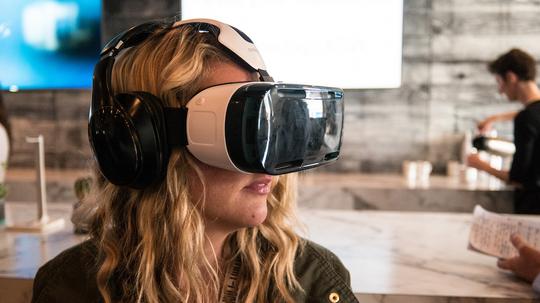
The hype surrounding virtual reality tends to be focused on consumer products, like playing video games or experiencing shows in Facebook's Oculus Rift or Samsung Gear.
But D.C. entrepreneur Morgan Mercer is using VR to solve a different problem: sexual harassment and assault training.
Called Vantage Point, her startup aims to create a virtual reality training program to help people fully immerse themselves in a training exercise. For example, one simulation could be an employee approaching the user about a workplace harassment incident that occurred, and the user would be asked to respond in the way they see fit.
No doubt, it's a timely topic, with news reports highlighting a different celebrity who has been accused of sexual assault or harassment. According to RAINN, or Rape Abuse Incest National Network, an American is assaulted every 98 seconds and one in every six women has either been the victim of rape or an attempted rape.
"It's not just a Silicon Valley problem, it's not a finance problem, it's not a Hollywood problem or a media problem. It's just a problem," Mercer said in an interview. "It's literally everywhere."
"It’s not just a Silicon Valley problem, it’s not a finance problem, it’s not a Hollywood problem or a media problem. It’s just a problem."
Mercer's product is early stage, with the team currently focused on finding the right partners to develop the training module further and raising funding. The training will begin with a pre-assessment test to gauge where each user is coming from and what might need more improvement. From there, trainings will work on basic bystander intervention training and other experiential situations.
Fundraising should wrap up in December. Script writing is set to take place in January, and filming in February. Vanishing Point Media, whose past clients include ABC, Banana Republic and Los Angeles' Comic Con, has been retained for the filming.
"There are some grants that we're applying for, and there are so many different avenues for funding that you have to pick a couple and just pursue them and see which ones fit," she said.
Mercer is quick to note that she doesn't have a virtual reality background. She comes from marketing, but she's always had an interest in VR and its capabilities. She'd head to panels on VR, its developments and its future. She'd find mentors who would talk to her about what it's like to be a women in the industry. Mercer knew that one day she would jump into the VR space, but she didn't know when.

Until a little while ago when she was talking with her now board member Sara Elizabeth Dill, the director of criminal justice standards at the American Bar Association, about sexual assault training. Mercer, a two-time survivor of sexual assault and violence, said too often she hears from other survivors about how no one knows how to respond when they share their stories. Maybe Mercer could marry her two passions — VR and sexual assault survivor support — into one startup.
In October, Mercer quit her full-time position and decided to pursue Vantage Point full time. They're pitching potential clients and investors, launching crowdfunding campaigns and amping up social media presences to get the ball rolling on the upcoming product.
"You either take the risk and you go all in and you give it your all, or you kind of live in that path where you're pursuing it and you're not giving it your all at the risk of potentially setting yourself up to fail," Mercer said.
Vantage Point's new product is scheduled to launch in April. They're targeting both colleges and universities and corporations for the trainings. Vantage Point would offer the service as a free pilot program to nonprofits and colleges, while charging for paid pilots right off the bat for businesses and corporations. Once the pilots are completed, interested parties would pay an annual subscription service to use the product. Five percent of Vantage Point's revenue will go towards a "Survivor Support Fund," which will help victims offset costs related to legal, counseling or other fees.
"We want to make sure that this is accessible," Mercer said. "If people don't have access to the program, it doesn't matter how amazing the program is."
Vantage Point's team includes Mercer and co-founder Louisa Spring. They have about five board members and counting, including entrepreneurs, legal professionals and top VR executives. One of their recent additions is Tony Parisi, a pioneer of VR and head of augmented reality and VR strategy at United Technologies.
Looking forward, Mercer wants to see the platform utilized for different issues, not just sexual harassment training. Vantage Point is eyeing issues like gender bias, cultural bias training and more.
"Never assume you know everything," Mercer said. "You have such a new industry and a new space, you have to consistently be open to new ideas."




